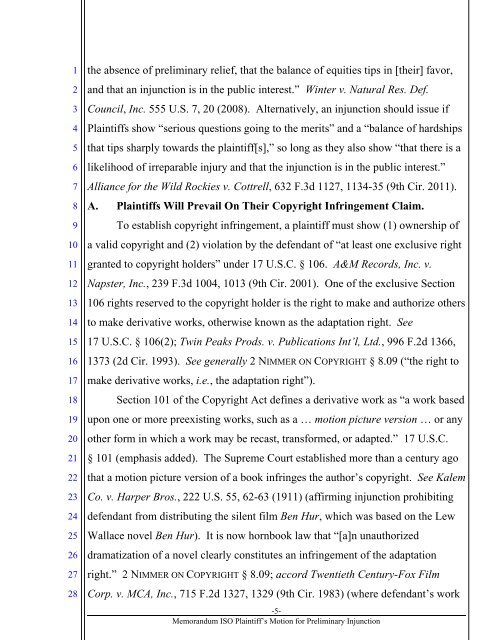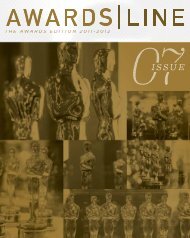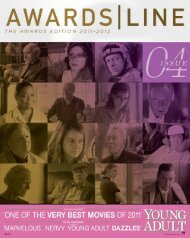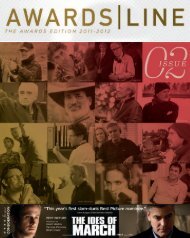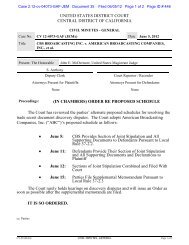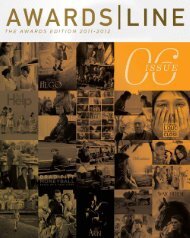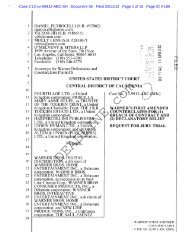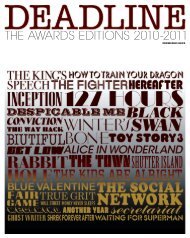Preliminary Injunction
Preliminary Injunction
Preliminary Injunction
You also want an ePaper? Increase the reach of your titles
YUMPU automatically turns print PDFs into web optimized ePapers that Google loves.
1<br />
2<br />
3<br />
4<br />
5<br />
6<br />
7<br />
8<br />
9<br />
10<br />
11<br />
12<br />
13<br />
14<br />
15<br />
16<br />
17<br />
18<br />
19<br />
20<br />
21<br />
22<br />
23<br />
24<br />
25<br />
26<br />
27<br />
28<br />
the absence of preliminary relief, that the balance of equities tips in [their] favor,<br />
and that an injunction is in the public interest.” Winter v. Natural Res. Def.<br />
Council, Inc. 555 U.S. 7, 20 (2008). Alternatively, an injunction should issue if<br />
Plaintiffs show “serious questions going to the merits” and a “balance of hardships<br />
that tips sharply towards the plaintiff[s],” so long as they also show “that there is a<br />
likelihood of irreparable injury and that the injunction is in the public interest.”<br />
Alliance for the Wild Rockies v. Cottrell, 632 F.3d 1127, 1134-35 (9th Cir. 2011).<br />
A. Plaintiffs Will Prevail On Their Copyright Infringement Claim.<br />
To establish copyright infringement, a plaintiff must show (1) ownership of<br />
a valid copyright and (2) violation by the defendant of “at least one exclusive right<br />
granted to copyright holders” under 17 U.S.C. § 106. A&M Records, Inc. v.<br />
Napster, Inc., 239 F.3d 1004, 1013 (9th Cir. 2001). One of the exclusive Section<br />
106 rights reserved to the copyright holder is the right to make and authorize others<br />
to make derivative works, otherwise known as the adaptation right. See<br />
17 U.S.C. § 106(2); Twin Peaks Prods. v. Publications Int’l, Ltd., 996 F.2d 1366,<br />
1373 (2d Cir. 1993). See generally 2 NIMMER ON COPYRIGHT § 8.09 (“the right to<br />
make derivative works, i.e., the adaptation right”).<br />
Section 101 of the Copyright Act defines a derivative work as “a work based<br />
upon one or more preexisting works, such as a … motion picture version … or any<br />
other form in which a work may be recast, transformed, or adapted.” 17 U.S.C.<br />
§ 101 (emphasis added). The Supreme Court established more than a century ago<br />
that a motion picture version of a book infringes the author’s copyright. See Kalem<br />
Co. v. Harper Bros., 222 U.S. 55, 62-63 (1911) (affirming injunction prohibiting<br />
defendant from distributing the silent film Ben Hur, which was based on the Lew<br />
Wallace novel Ben Hur). It is now hornbook law that “[a]n unauthorized<br />
dramatization of a novel clearly constitutes an infringement of the adaptation<br />
right.” 2 NIMMER ON COPYRIGHT § 8.09; accord Twentieth Century-Fox Film<br />
Corp. v. MCA, Inc., 715 F.2d 1327, 1329 (9th Cir. 1983) (where defendant’s work<br />
-5-<br />
Memorandum ISO Plaintiff’s Motion for <strong>Preliminary</strong> <strong>Injunction</strong>


